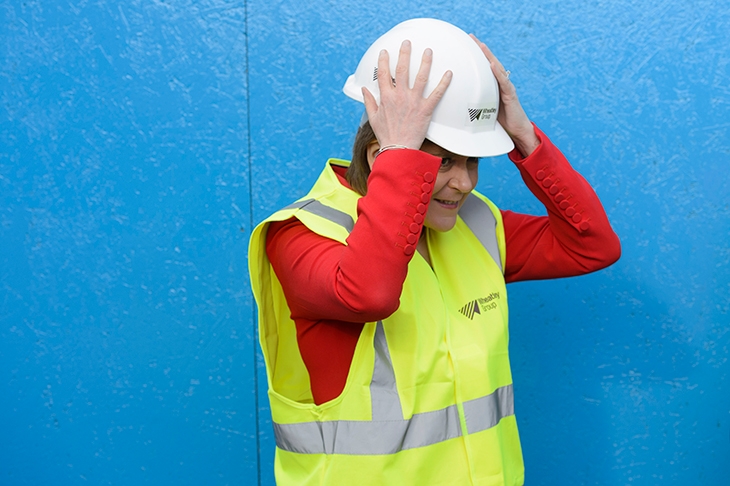Nicola Sturgeon depresses me and seems to be having the same effect on Scottish house prices. In a housing market described by departing Bank of England economist Andy Haldane as ‘on fire’, the flames have been rising higher the further away from London — but more or less extinguishing themselves at Hadrian’s Wall. Why buyers are scarcer in Nicola’s domain is a question I’ll leave to our political writers, but the broader picture of soaring home prices across the rest of the UK is an unforeseen pandemic effect that may have painful consequences.
Nationwide’s June data shows an annual price-rise bar chart increasing steadily from 7.3 per cent in London through the English provinces to 13 per cent in Yorkshire and Humberside and even higher in Wales and Northern Ireland. The stamp-duty holiday that’s now tapering off (and in fact stopped on 31 March in Scotland, where the rise is just 7.1 per cent) has clearly added fuel. But the urge to escape the capital for wider, greener, work-from-home space is a shift the Chancellor surely didn’t anticipate.
Low interest rates, for now, mean mortgage affordability remains close to its long-run average, but a first-time buyer frugal enough to put away 15 per cent of take-home pay will need five years to save the deposit for a basic home. Meanwhile, planning hold-ups combined with shortage of materials and tradesmen mean new-build supply won’t increase significantly in the short term.
All this can only add to inflationary pressures and intergenerational resentment. I know one couple with small children whose dream is to buy a croft in Orkney; perhaps, despite the Nicola effect, they’ll set a trend for the English young to seek cheap homes and new lives north of the border. They might even swing the vote to stay in the UK.
Crosser than ever
I’m overdue for one of my angry reports on the non-progress of Crossrail. But the engineering marvel that should have transformed east-west London travel is much longer overdue and will be £5 billion over budget by the time it finally carries a passenger — in the middle of next year at the earliest — so it may be better for my blood pressure if I don’t mention it again until then.
The good news is that eight trains per hour are currently running through the central tunnels on a trial basis. The bad news is that the Elizabeth Line, as we’ll learn to call it, may open without a stop at Bond Street, the eyesore site plagued by ‘design co-ordination problems’ that will be the last station completed. Meanwhile, a ‘status report’ recently presented to the London Assembly makes bizarre reading, because its key dates are all redacted: ‘There is little evidence of improvement in stations delivery to support the start of Trial Operations on [blank]… Start of Timetable Running on [blank] is at risk and is more likely to occur in early [blank].’
So many politicians, bureaucrats and contractors have their fingerprints on this world-scale fiasco that they’re hardly worth naming and shaming. Just let me travel on the [blank] thing once before I die, or before I graffiti what I really think about it on its [blankety-blank] Bond Street wall.
Crypto crimes
I also feel it’s my duty to keep you abreast of crypto news, not least in case you should ever feel tempted to venture your life savings in that arena. Scotland Yard last week seized £114 million worth of bitcoin from an unnamed suspect’s account, confirming that the virtual currency now so popular with thrill-seeking investors is also a favourite for money launderers. And the Financial Conduct Authority ruled that Cayman Islands-based Binance, ‘the world’s largest crypto exchange’, cannot conduct regulated activity in the UK — more of a red flag than a real ban, since regrettably the FCA has no sway over crypto activity.
Finally, readers in El Salvador will be excited to know bitcoin is now recognised there as legal tender alongside the US dollar. But would I be stereotyping to think that if I have any readers in El Salvador, they’re probably money launderers on the lam?
Cut-price compromise
My ideas for financing the Prime Minister’s proposed £200 million royal yacht-cum-trade platform have fallen on stony ground. Not only have no donors stepped forward, even the royals themselves have signalled they’re not keen on such conspicuous extravagance, while Downing Street’s artist’s impression has been dismissed as resembling ‘a Hull fishing trawler’.
So here’s my face-saving cut-price compromise: buy a redundant cruise ship, of which in Covid conditions there are dozens of all sizes to choose from. Specifically, buy MV Minerva, the much-missed host vessel for Mediterranean tours laid on by the Swan Hellenic company in its former incarnation. Almost the same length as the old HMY Britannia and similarly done out like a 1950s English country hotel, she’s laid up in the Greek port of Elefsis and on sale at Yachtworld for a bargain £27.5 million.
Hancock on parade
I once competed in a beauty contest against Matt Hancock. It was run by a speaker agency for an audience of conference bookers, and the other contestants were the tall, bald, rather scary historian Jeremy Black and the statuesque former White House staffer Pippa Malmgren, who talked global economics at machine-gun speed. None of them played it for laughs, least of all little Hancock — then a new MP in his early thirties — who came across like a sixth-form swot from The Inbetweeners. I raised a titter with the riff I used to do about being the poor man’s Robert Peston, but I never did find out which of us got the most gigs out of the parade. If the fallen health secretary’s next career is on the after-dinner circuit, perhaps he’ll hire me as his joke writer.







Comments